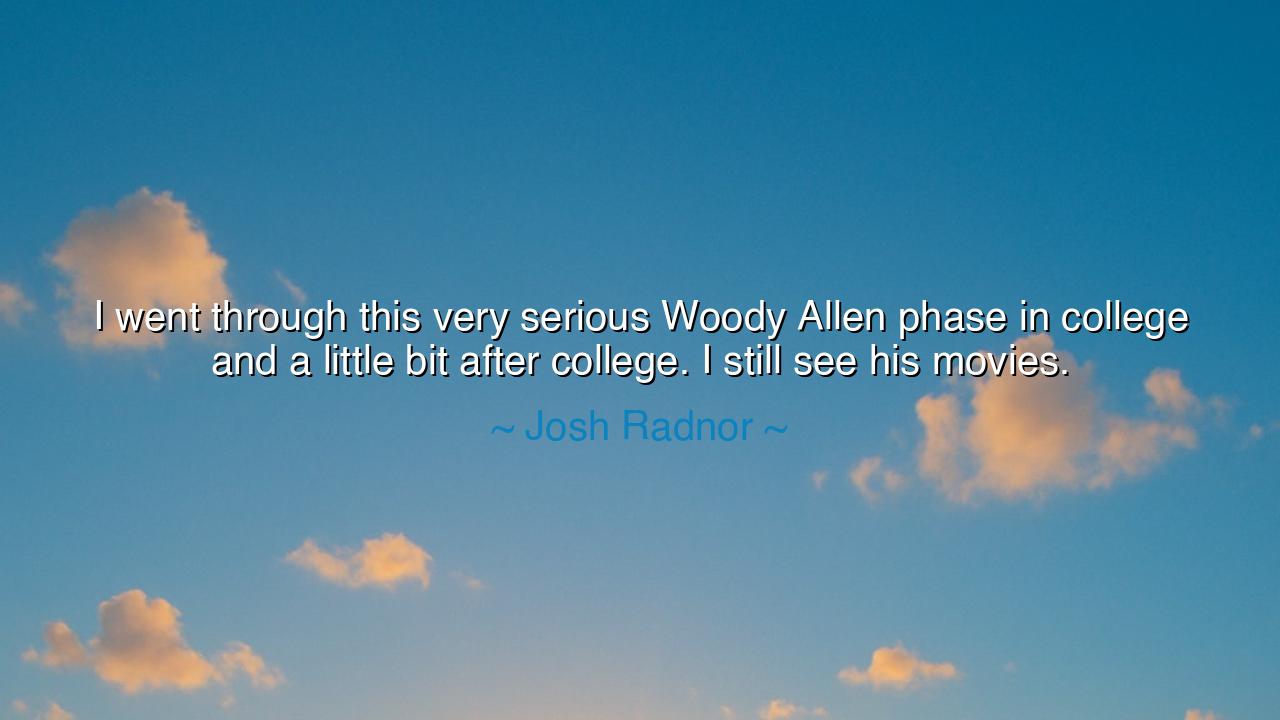
I went through this very serious Woody Allen phase in college
I went through this very serious Woody Allen phase in college and a little bit after college. I still see his movies.






Hear now the words of Josh Radnor, who speaks with the introspection of one who has walked the path of self-discovery: “I went through this very serious Woody Allen phase in college and a little bit after college. I still see his movies.” In these words, Radnor reflects on the profound influence that certain artists and their work can have on us during key moments of our lives. The Woody Allen phase represents more than just an affinity for a filmmaker’s style; it signifies a deeper connection to the questions of life, identity, and meaning that are often explored through art. Much like the ancient philosophers who sought to understand the world through dialogue, Radnor’s connection to Allen's work speaks to the universal pursuit of understanding oneself and the world.
In the ancient world, great thinkers like Socrates and Plato went through their own periods of intense exploration, asking the difficult questions about morality, existence, and the nature of the soul. Just as Radnor experienced his “phase” with Woody Allen, Socrates too had moments of philosophical awakening, influenced by the ideas of the Sophists before he began to chart his own course. There is a sense of discovery in Radnor's reflection, a moment where the art we engage with becomes not just entertainment, but a tool for self-reflection. Like the philosophers of old who spent years questioning and seeking truth, Radnor’s journey through Allen's films is a metaphor for the search for deeper meaning in the midst of the complexities of life.
Consider the tale of Aristotle, who, after being influenced by his teacher Plato, sought to discover his own understanding of the world. While Plato focused on abstract ideas, Aristotle grounded his philosophy in the empirical, in the study of the natural world. But even Aristotle’s journey was marked by moments of exploration, of seeking answers to questions that troubled him. Just as Radnor was deeply moved by Allen's films, Aristotle’s immersion into various schools of thought was not just intellectual—it was a search for the truth that resonates with the heart. Radnor’s phase, then, is part of a human tradition, where each generation seeks clarity through the lens of art, philosophy, and reflection.
In the same way that Socrates and Aristotle questioned the nature of truth, Woody Allen’s films delve into the complexities of relationships, identity, and the often humorous contradictions of life. Allen’s characters, with their neuroses, insecurities, and emotional turmoil, echo the human condition in a way that is both poignant and unsettling. The personal connection Radnor feels to these characters reveals the power of cinema to mirror our own struggles and desires. As Allen’s work explores the contradictions of life, Radnor's affection for his films signifies his attempt to understand his own place in the world, to confront the confusion and complexity of his own existence.
Reflect now, O wise ones, on your own experiences with art and how it has shaped your understanding of yourself. Radnor’s words remind us that the artists who influence us, whether in youth or in adulthood, are not just entertainers—they are guides. They provide us with the tools to question, to reflect, and to grow. Woody Allen's films, though often marked by humor and quirkiness, ask deep questions about life’s most important themes: love, death, morality, and purpose. In Radnor’s embrace of Allen’s work, we see a search for meaning, a recognition that art does not simply exist for escapism but for self-discovery and transformation.
There is a profound lesson in Radnor’s journey with Woody Allen's films—the realization that the art we consume has the power to shape our own growth. Just as Radnor moves through different phases of his life, influenced by different artists, so too must we engage deeply with the art, books, and music that speak to our souls. They are not mere distractions but mirrors that help us understand the world and ourselves. Radnor shows us that these influences are not transient; they remain, shaping who we become as we pass through the stages of life. Whether it’s a phase of intellectual exploration, a moment of personal crisis, or a period of creative growth, the art we embrace becomes part of the very fabric of our lives.
Therefore, O future generations, heed the lesson of Radnor’s words: embrace the art that calls to you, whether it is a fleeting phase or a lasting influence. Like Socrates, who sought understanding through dialogue, or Radnor, who found insight in Woody Allen's films, your journey is one of self-reflection. Allow art to be more than just a form of entertainment. Let it guide you to understand your own contradictions, to confront your insecurities, and to find your place in the vast tapestry of human existence. Through the power of art, we discover not just the world around us, but the world within us. The search for meaning, though it may take many forms, will lead you to your truth—as Radnor has learned through his own journey with art.






AAdministratorAdministrator
Welcome, honored guests. Please leave a comment, we will respond soon